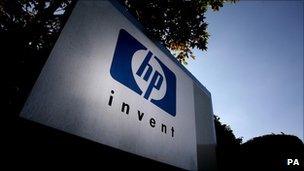Are we going to lose our Autonomy?
- Published
- comments

HP plans to axe some 27,000 workers
The decline of HP is beginning to look like a slow-motion car crash, much like what's been happening at Nokia and RIM.
Today's radical surgery, with the loss of 27,000 jobs worldwide, is meant to put this American computing icon back on track. But as well as the anxiety for many of the firm's UK workers, there is also a serious question mark over the future of a major British technology success story, Autonomy.
When HP paid what now looks an extraordinary and perhaps foolish price to acquire the Cambridge-based firm last year, I wrote that it was good news and bad news. Great for the shareholders - and for Autonomy's chief executive who made £500m from the deal - but worrying for the prosperity of Cambridge and the UK hi-tech sector.
But Mike Lynch was staying on - indeed he was put in charge of one of HP's most important divisions - and he was keen to reassure everyone that there would be continued investment in the UK.
Now Mr Lynch has been shown the door, along with most of his senior team at Autonomy. HP is briefing that this is the inevitable result of failing to meet targets, and suggesting that the Autonomy founder wasn't up to the job of running such a large-scale business.
Friends of Mr Lynch say he was increasingly exasperated by the way HP was being run, and what he saw as the failure of its leaders to understand both the technological and strategic challenges it faced.
So where does this leave Autonomy, and the Cambridge cluster that has been the UK's hi-tech superstar for some years? In the short-term it's difficult to see HP putting more investment into the business, and projects like the Aurasma augmented reality service must fear for their future.

Aurasma in action
But Mr Lynch is already talking of his determination to start again.
"The fact that there are talented experienced people with access to capital now available to start new businesses is very positive for UK PLC," he says.
And it's true that even if work at Autonomy dries up, there is plenty of demand for skilled staff in Cambridge. I'm told that one fast growing software firm sends an ice cream van to the science park offering free cornets to lure engineers to interviews.
But there are still lessons to be learned from the Autonomy story. Fast growing software firms still run by mercurial and impatient founders don't make a good fit with lumbering bureaucracies.
And next time a UK technology business sells up to an American giant and tells us not to worry, that ownership doesn't matter, we have the right to be just a little bit cynical.